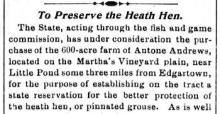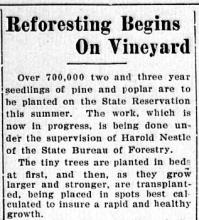Starting Monday morning, buyers of Martha’s Vineyard real estate will pay two per cent of the purchase price to the Martha’s Vineyard land bank. Tisbury voters yesterday followed the other five Island towns by endorsing the measure designed to raise money for preservation of natural and recreational resources.
The Dukes County commissioners this morning were to appoint one person from each Island town to the land bank commission. The state secretary of environmental affairs will appoint a seventh member.
Early this morning, Priscilla Sylvia of Oak Bluffs, Herbert Custer of Tisbury and Deborah Yennie of West Tisbury expressed relief and even surprise that the land bank won in Tisbury by a 585 to 314 margin. The three served on the study committee which drafted the bill and guided it through the state legislature over the last two years. During the last week they and fellow members admitted to fears that opponents might convince voters in Tisbury — the Island town smallest in land area and largest in population — to vote no. Such an outcome would have buried the land bank for good.
“I guess it’s that the last piece in the puzzle sometimes doesn’t fit,” Mrs. Sylvia said. “You don’t let yourself quite think everything’s sure.
“I’m very proud of Tisbury. I’m very proud of the Island. All six of the towns agreed on one thing.”
The land bank is expected to raise $2.5 million to $3 million a year, based on Vineyard sales totalling nearly $154 million last year. The regional land bank commission and advisory boards in each town will split the tax proceeds raised in each town. The commission will concentrate on regional projects to protect groundwater and other natural resources, and to create public access to recreation areas. Each advisory board will have power to buy land in town; to contribute to projects that might give their townspeople access to recreation land elsewhere; and to veto regional land bank purchases within its borders.
The tax goes into effect Monday morning when the registry of deeds and the county commissioners’ office open. Register of deeds Beverly King kept her office open last night until 8 p.m., and then closed the office to land sale filings until Monday.
Working from a similar measure in Nantucket, the study committee in 1984 — with help from state Sen. Paul V. Doane and state Rep. Howard C. Cahoon Jr. — guided the bill through the state legislature to the desk of Gov. Michael S. Dukakis, who signed it into law this past Jan. 3.
The creation of town advisory boards grew out of concerns expressed about all money generated in a town going to the regional commission. Even so, at the Edgartown town meeting in April, Robert J. Carroll spoke against the land bank, saying money generated in Edgartown would benefit other towns. And employees of Oak Bluffs businessman Douglas Abdelnour handed out anti-land bank flyers at town meeting and the polls in that town. But the votes came out 636-158 in Edgartown and 669-315 in Oak Bluffs.
A week later Gay Head approved it 51-16. Two weeks ago Chilmark approved the measure 415-56 and West Tisbury endorsed it 229-34.

Editorial: The Battle Will Continue
Yesterday, the Martha’s Vineyard Land Bank faced its final hurdle at the polls in Tisbury. The voters of Tisbury might well have taken the narrow view that theirs, of all Vineyard communities, stood least likely to gain from the land bank. After all, Tisbury is the Island’s smallest town in land mass but its largest in population; it is unlikely that Tisbury will be a primary site for the conservation land purchases for which the land bank is intended.
It is to their credit that Tisbury’s people joined their neighbors across the Island yesterday in voting for the land bank. Theirs was a statement of enlightened self-interest, for the land bank will bring benefits not just to the abutters of parcels saved from development, but to the Vineyard community as a whole.
From its beginnings more than two years ago to its happy conclusion yesterday, the land bank drive has been a model of regional cooperation of the very finest sort. Ask the members of the Island land bank study committee about their experience together, and you will learn both how hard they labored and how rewarding they found the business of shaping and then working toward this common goal for the Island’s broadest good.
For that dedicated committee and for all who love the Island, this is a morning for celebration.
It is also time to say unequivocally that the Martha’s Vineyard Land Bank alone is not the answer. If unchecked growth and the blight of instant, unplanned summer suburbs is the Vineyard’s problem, the land bank alone is not the answer. If threatened groundwater, congested streets and overflowing dumps are the problem, the land bank alone is not the answer. Over the long term, the land bank will be one more tool — and a powerful one — in the Vineyard’s arsenal of protections for a future in which our environment is defended against ruin. It will by no means allow the many public and private guardians of this fragile place to relax their vigilance.
The birth of the land bank this spring, like that of the Martha’s Vineyard Commission a dozen springs ago, is a historic moment in the battle for the Island’s future. The land bank will bring great benefits if all the communities of the Island remember that even after this victory, the hard, work must continue.












Comments